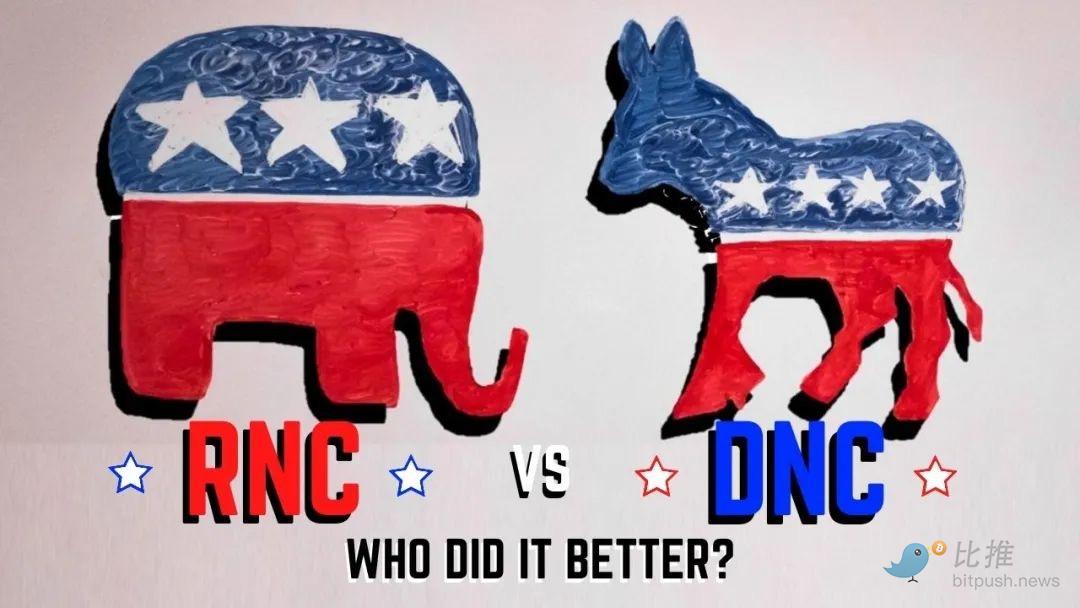By Eleanor Mueller, Declan Harty and Jasper Goodman
Compiled by: BitpushNews Mary Liu
The cryptocurrency industry is having a greater impact on U.S. politics than ever before.
But behind the scenes, the left and the right are divided over who to support as president and control Congress next year.
Democratic cryptocurrency lobbyists, executives and investors say the industry is at risk of moving too far to the right as its leaders flock to support Republican presidential candidate Donald Trump, who has pledged policies to boost digital asset companies.
Their Republican counterparts say reaching out to Democratic nominee Kamala Harris and backing her party’s junior candidate could isolate longtime GOP allies and offer little hope of success. The Biden administration is skeptical of cryptocurrency trading, and it’s unclear how Harris would proceed.
The internal dispute has surfaced as the crypto industry’s nearly $170 million super PAC has begun pouring money into key races across the country and as some cryptocurrency advocates have sought to reach out to Harris.
After crypto super PAC Fairshake announced it would spend millions of dollars to recall Ohio Senator Sherrod Brown, Democratic megadonor Ron Conway said he would cut ties with Fairshake.
When Fairshake decided to endorse Democratic Reps. Ruben Gallego of Arizona and Democratic Rep. Elissa Slotkin of Michigan in Senate races in their battleground states, Republican lawmakers including Rep. Steve Daines of Montana expressed displeasure to the cryptocurrency executive, according to a person briefed on the matter who requested anonymity to discuss private conversations.
“There’s a lot of emotion right now,” said Kristin Smith, CEO of the Blockchain Association. “There are industry strategies, there are individual strategies — and sometimes those strategies may not align perfectly.”
Nearly a dozen cryptocurrency advocates familiar with the conflict said in interviews that the escalating tensions have created new obstacles for the industry as it tries to push regulatory changes through Congress, which have been elusive due to election-year politics and limited speaking time.
“Since the Ohio Super PAC was announced, it’s been a mess,” said a congressional aide who spoke on condition of anonymity. “Democrats are crazy, Republicans are crazy, everybody is crazy.”

It’s not uncommon for election-year dynamics to hamper bipartisan momentum, but it’s noteworthy that an industry is so divided over how to proceed. Even defunct cryptocurrency giant FTX contributed huge sums to both parties.
“There are about an equal number of Republicans and Democrats and independents,” said one cryptocurrency lobbyist who asked not to be named. “It’s just a unique industry and it’s creating conflict.”
Cryptocurrency’s biggest political campaign funders are becoming increasingly outspoken about their personal views.
Marc Andreessen, co-founder of Andreessen Horowitz, whose venture capital firm is a major backer of cryptocurrencies, recently declared Trump the “right choice” for the “future of our business.” Cameron and Tyler Winklevoss, co-founders of digital asset firm Gemini, said they would each donate $1 million to Trump.
“There’s been a lot of vitriol from the center-right, from very high-profile CEOs and investors, which has caused a lot of consternation on the left,” said Jonathan Padilla, a cryptocurrency entrepreneur who helped launch Crypto4Harris, a group backing Democratic candidate Kamala Harris, in an effort to drum up support for the vice president.
The tensions are spreading to Capitol Hill, potentially jeopardizing bipartisan support for cryptocurrency-friendly legislation this year, an issue that has taken on a more partisan tone since 71 Democratic House members helped 208 Republicans pass a cryptocurrency reform bill in May.
Weeks before becoming Trump’s running mate, Ohio Senator JD Vance began promoting a cryptocurrency regulation proposal that was unlikely to gain cross-party support. Senate Agriculture Committee Chairwoman Debbie Stabenow (D-Mich.) canceled a committee vote on his cryptocurrency bill after she was unable to gain Republican support.
Some cryptocurrency supporters are now raising the idea that the industry should be cautious about pushing for votes until Trump is elected and Republicans gain seats in the Senate.
While top Democrats, such as Majority Leader Chuck Schumer, have been open to the crypto industry’s concerns, they believe Republicans would be more reliable allies.
“If you think Donald Trump is going to win the election, especially if you think the Senate is likely to be controlled by Republicans, why negotiate with your own people?” said one cryptocurrency lobbyist who spoke on the condition of anonymity to discuss the idea.
Democratic cryptocurrency lobbyists and lawmakers warned that going all-in with the Republicans was shortsighted. They are struggling to make headway with Harris’ campaign and remain hopeful she can push for more supportive policies than Biden, whose regulators have been at loggerheads with digital asset firms.
“Crypto advocates who have engaged with Harris don’t believe in putting all their eggs in one basket or in one party,” said Sheila Warren, CEO of the Crypto Innovation Council. “I think it’s seen as brave, or pointless, which is a sad state of affairs, but that’s where we are.”
Concerns about fractured relations on the left intensified after a cryptocurrency super PAC announced plans to spend $12 million to support Brown’s Republican opponent, Bernie Moreno, in his U.S. Senate race in Ohio. If re-elected, Brown would likely chair the Senate Banking Committee next year and have a significant say over the future of cryptocurrency regulation, making the move a risky bet.
“Anyone who cares about the future of cryptocurrency should want this issue to remain a bipartisan discussion,” said Rep. Wiley Nickel, a North Carolina Democrat who is trying to connect Harris’ campaign with cryptocurrency industry players. “Anything less than that will poison the crypto world for the next decade.”
Republicans who support cryptocurrency say it is naive to hold out hope for the Democratic Party, which is home to some of the industry’s biggest opponents, including Securities and Exchange Commission Chairman Gary Gensler and Massachusetts Sen. Elizabeth Warren, who have warned that cryptocurrency trading poses dangers to consumers and the financial system. Harris does not have a clear record on the issue.
“I’m very concerned that many of the candidates are changing their tune on this issue for political gain,” said Sen. Cynthia Lummis, R-Wyo., a prominent cryptocurrency supporter, who said she was “very skeptical of Harris’s alleged change of tune.”
Fairshake has poured huge sums of money into both Republicans and Democrats in an effort to win allies and quell critics. But that doesn’t mean either side is happy: The group said it has spent about $75 million of the $169 million it raised and declined to comment for this story.
Some Democratic donors, including tech billionaire Kellyanne Conway, have warned that the group’s spending is more broadly aimed at winning a Republican majority in Congress.
Republicans are also unhappy with super PACs' support for Democrats, which some see as a betrayal over the years. Among them is Montana Senator Daines, who led the Republicans to retake the Senate.
“You piss off the people who are driving the industry because this party is skeptical at best,” said one Republican strategist who spoke on condition of anonymity in private discussions. “There have been conversations among Republican lawmakers about, ‘Do you think twice before meeting with people in the cryptocurrency industry?’ ”








